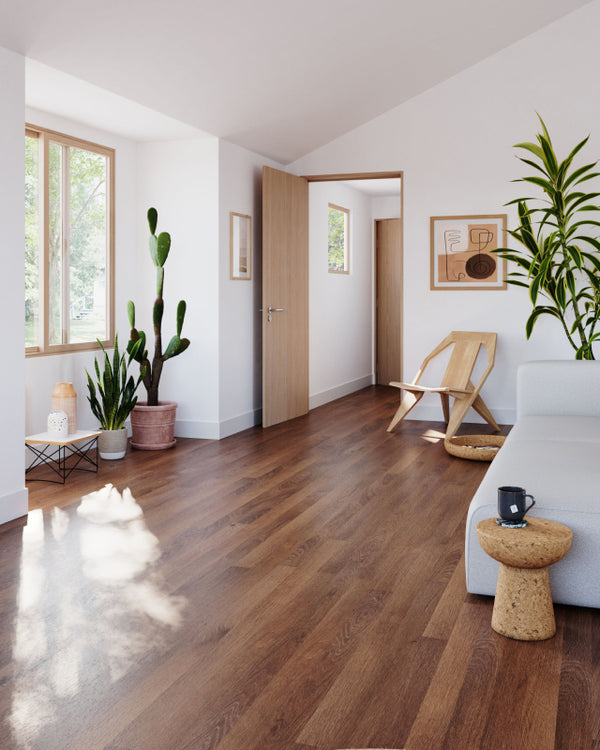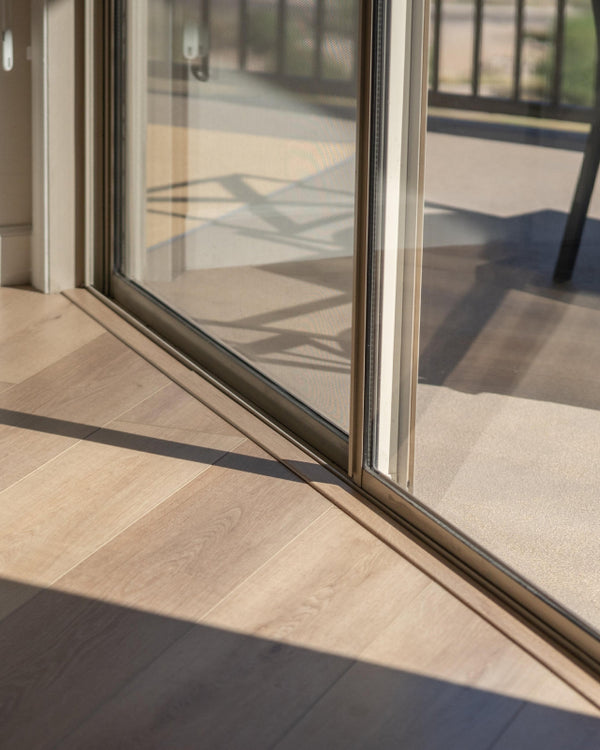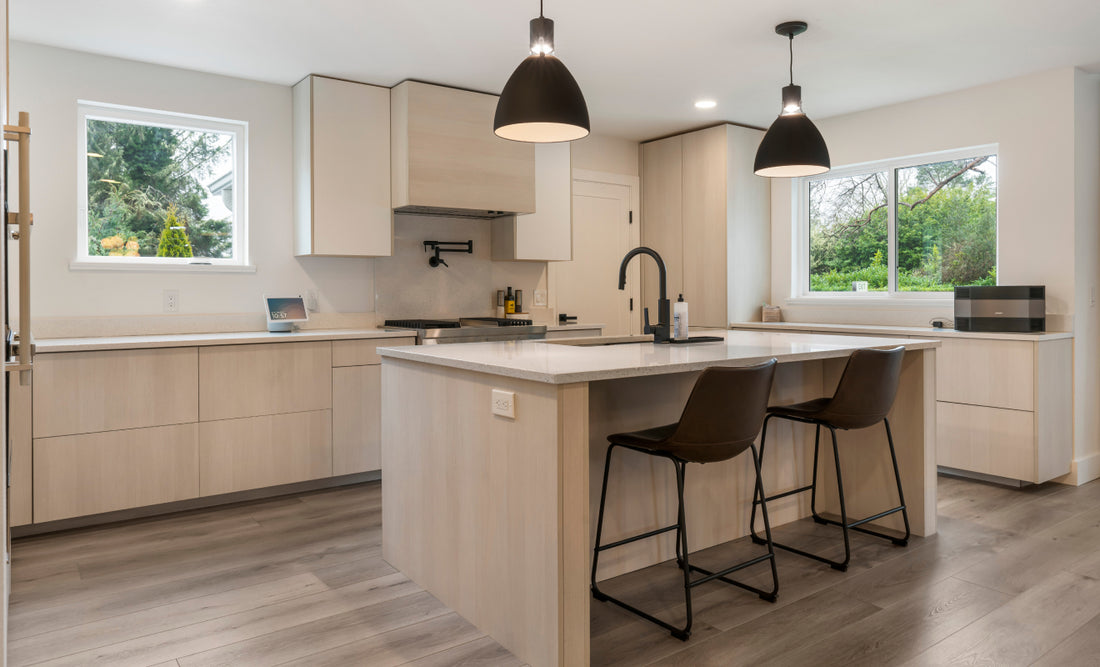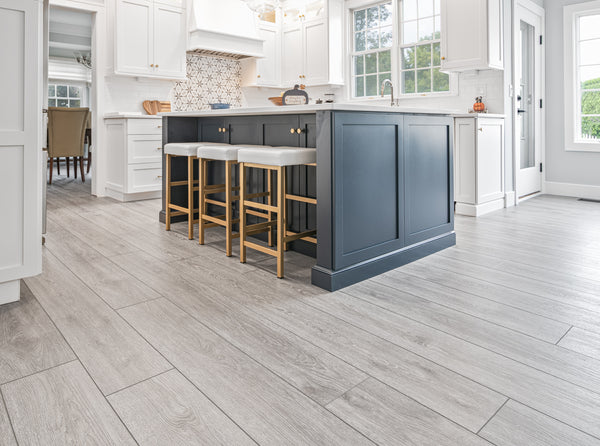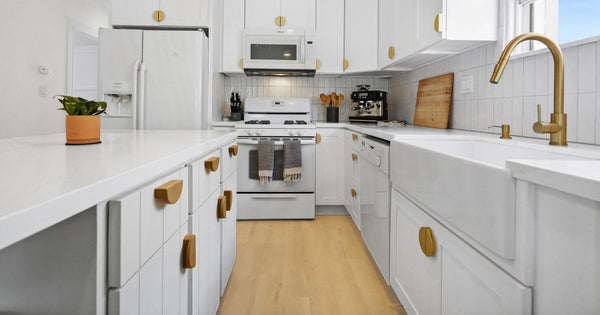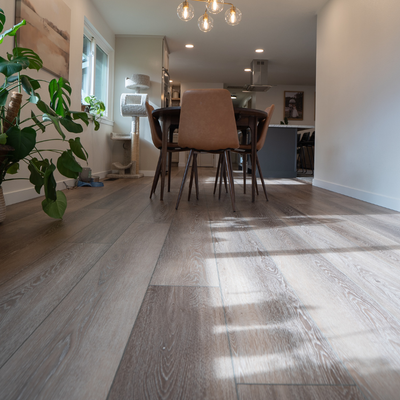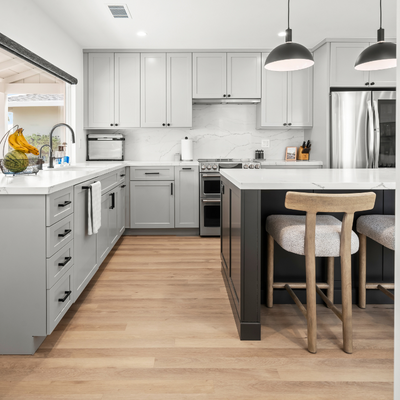When it comes to choosing the perfect flooring for your home, the debate between Luxury Vinyl Plank (LVP) and traditional hardwood often arises. While hardwood has been a popular choice for centuries, LVP is rapidly gaining traction due to its many advantages. Let’s explore why LVP might be a good choice, and some of the things you’ll want to consider when making your decision.
Durability and Resilience
One of the standout features of LVP is its durability. Traditional hardwood, while beautiful, is susceptible to scratches, dents, and general wear and tear, especially in high-traffic areas. LVP, on the other hand, is designed to withstand heavy use and show less signs of damage. The rigid core in LVP provides extra stability, making it resistant to impacts and heavy foot traffic. This makes LVP an ideal choice for homes with pets, children, or simply high activity levels.

Waterproof Capabilities
A significant advantage of LVP over hardwood is its waterproof nature. Our Modin planks are 100% waterproof so no amount of moisture will harm them. The core is waterproof throughout so even after the plank is cut it will maintain its 100% waterproof rating.
Hardwood can warp, stain, or swell when exposed to moisture, making it a less suitable option for areas like kitchens, bathrooms, or basements. LVP, being waterproof, can be installed in any room without the worry of water damage. This feature not only extends the lifespan of the flooring but also provides peace of mind in areas prone to spills or high humidity.
Water damage in homes happens more than you would think, making this a standout feature when comparing LVP and traditional hardwood flooring.

Design Versatility
LVP has come a long way in terms of aesthetics. Our Modin LVP Collection features designer-curated planks, offering a wide range of styles, colors, and patterns that mimic the look of natural hardwood. This means you can achieve the timeless beauty of hardwood with the added benefits of LVP. Whether you prefer a classic oak finish, a rustic reclaimed wood look, or a sleek modern design, there is an LVP option to match your vision. Our selection ensures that you have access to the latest trends and timeless styles, allowing you to create a space that truly reflects your taste.

Ease of Maintenance
Maintaining traditional hardwood floors can be labor-intensive, requiring regular polishing, sanding, and refinishing to keep them looking their best. LVP, however, is much easier to care for. Simple cleaning methods such as sweeping and occasional mopping are usually sufficient to keep LVP floors looking pristine. This ease of maintenance makes LVP a practical choice for busy households.
Cost-Effectiveness
LVP is generally found at a lower price point than traditional hardwood, and proves to be more cost-effective in the long run. The durability and low maintenance requirements of LVP reduce the need for costly repairs and replacements over time.
A thicker wear layer on LVP flooring will also contribute to long-term savings by extending your floor's lifespan and reducing the frequency of replacements. When you’re looking at LVP options, try to find the thickest wear layer within your budget. Our Modin Signature and Modin Craftsman collections are built with a 40 mil (1.0 mm) wear layer, which is well above the industry standard.
Consider this cost analysis per square foot over 20 years in a commercial space:
A 4 mil wear layer product may end up costing $24.45 per SF over 20 years, including replacement expenses. In contrast, a 40 mil wear layer product could cost as little as $7.00 per SF for the same duration.
Additionally, the installation process for LVP is generally quicker and less expensive than that for hardwood, adding to its overall affordability. Our Modin LVP is designed to be DIY-friendly, even for beginner DIY enthusiasts so you can cut out the cost of hiring an installer.

Comfort and Sound Insulation
LVP with a rigid core provides a comfortable underfoot experience, often softer and warmer than hardwood. This makes walking on LVP more pleasant, especially in colder climates. The IXPE foam underlayment that comes pre-attached to our LVP planks has an excellent sound insulation rating (up to IIC 64 / STC 62) and contributes to the floor feeling soft underfoot. You’ll find that LVP offers better sound insulation than hardwood, reducing noise from footsteps and creating a quieter, more serene environment in your home.
Considering Resale Value
If you're replacing an especially old carpet, damaged tile, or outdated linoleum, the immediate impact of vinyl plank flooring can be a simple, low-cost update that brings in buyers.
Alternatively, in the upscale market segment where authentic wood flooring is expected and standard within the luxury price range, vinyl flooring might not be seen as an upgrade. However, LVP flooring can be strategically used in areas of the home where its waterproof feature is beneficial, such as in a laundry room or basement.
